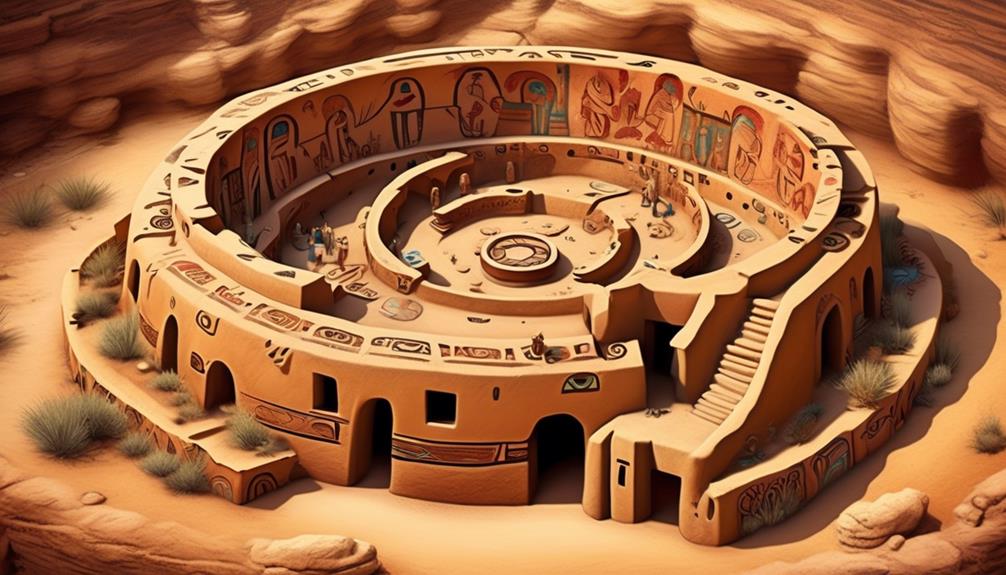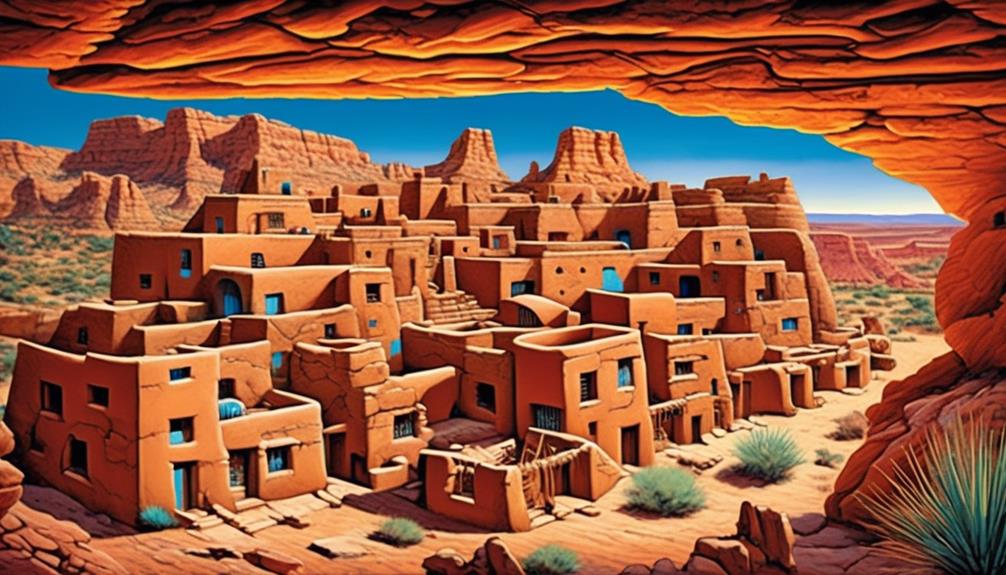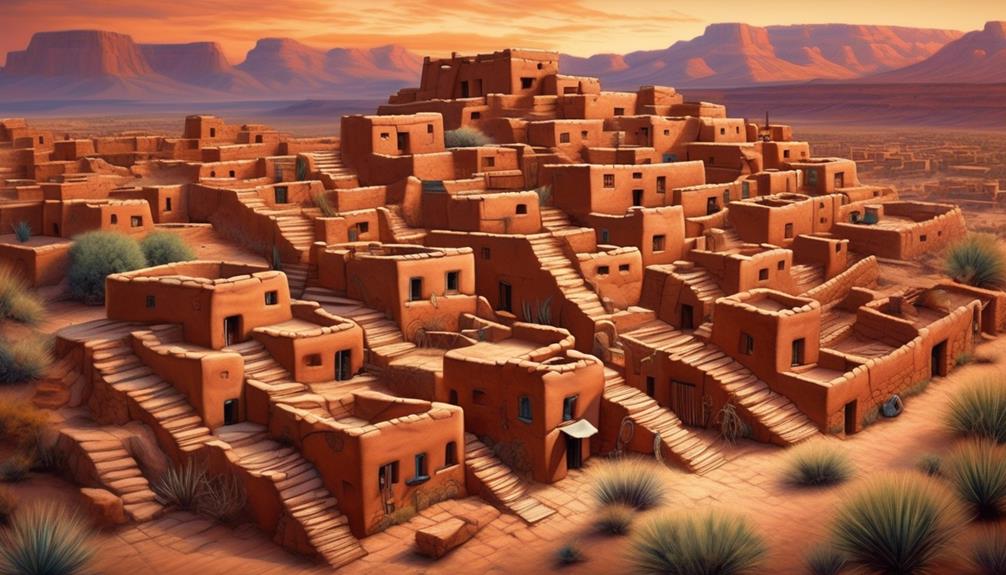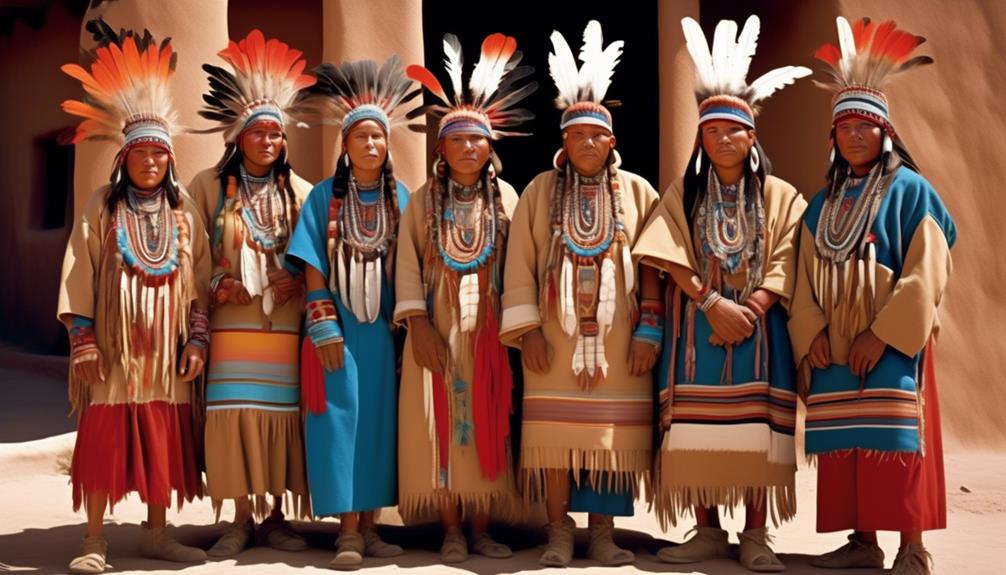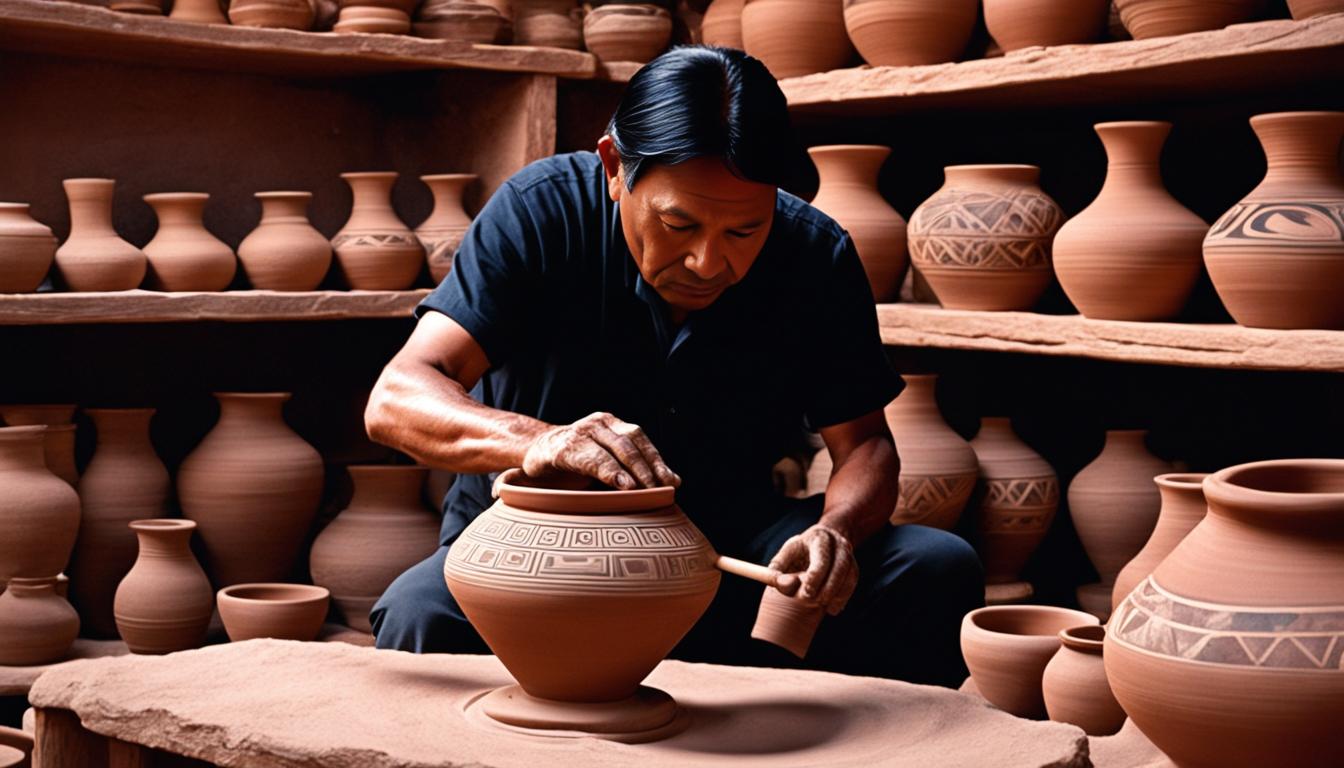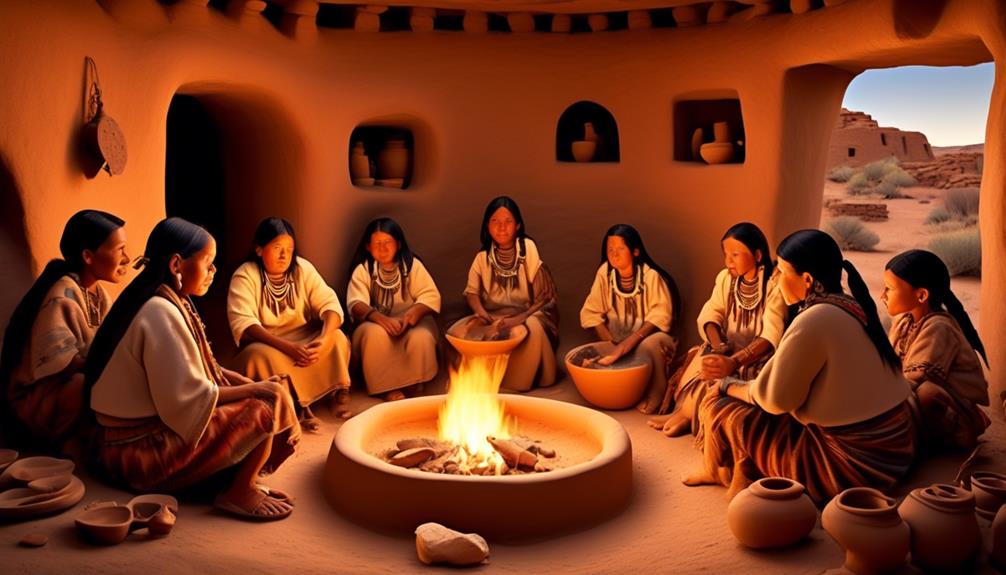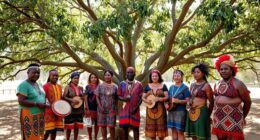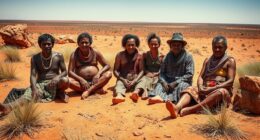As we delve into history, the religious beliefs of the Hopi tribe emerge as a intricate tapestry interwoven with traditions and spirituality. Their faith, intricately connected to the land they inhabit, permeates every aspect of their lives from birth to death.
But what exactly is the religion of the Hopi tribe, and how does it shape their worldview and daily practices? Join us as we journey through the sacred stories, ceremonial rituals, and the influence of modern culture on the religious fabric of the Hopi tribe.
Key Takeaways
- Hopi religion is deeply rooted in their migration history and spiritual connection to the land.
- The Hopi believe in a pantheon of deities associated with different aspects of the natural world and human experience.
- Elaborate ceremonial practices and rituals, including Kachina ceremonies and shamanic healing, are integral to Hopi traditions.
- The Hopi tribe has a strong reverence for the land, practicing environmental stewardship and viewing nature as a teacher with spiritual significance.
Origins of Hopi Religious Beliefs
The origins of Hopi religious beliefs can be traced back through oral traditions, archaeological evidence, and the cultural practices of the Hopi people. The Hopi migration is a critical aspect of their religious beliefs, as it's believed that their ancestors journeyed through different lands before settling in the Southwest. This migration is intricately woven into their religious narratives and shapes their spiritual connection to the land.
Katsina spirits hold immense significance in the religious beliefs of the Hopi tribe. These spirits are revered as messengers between the Hopi people and the spiritual world. They're central to the Hopi religious ceremonies and are believed to bring blessings, guidance, and protection to the community. The Katsina spirits are embodied in the form of elaborately crafted dolls and are an integral part of the Hopi religious rituals and dances.
Understanding the origins of Hopi religious beliefs provides valuable insights into the cultural and spiritual practices of the Hopi tribe, showcasing the deep connection between their history, land, and belief system.
Spiritual Deities and Sacred Stories
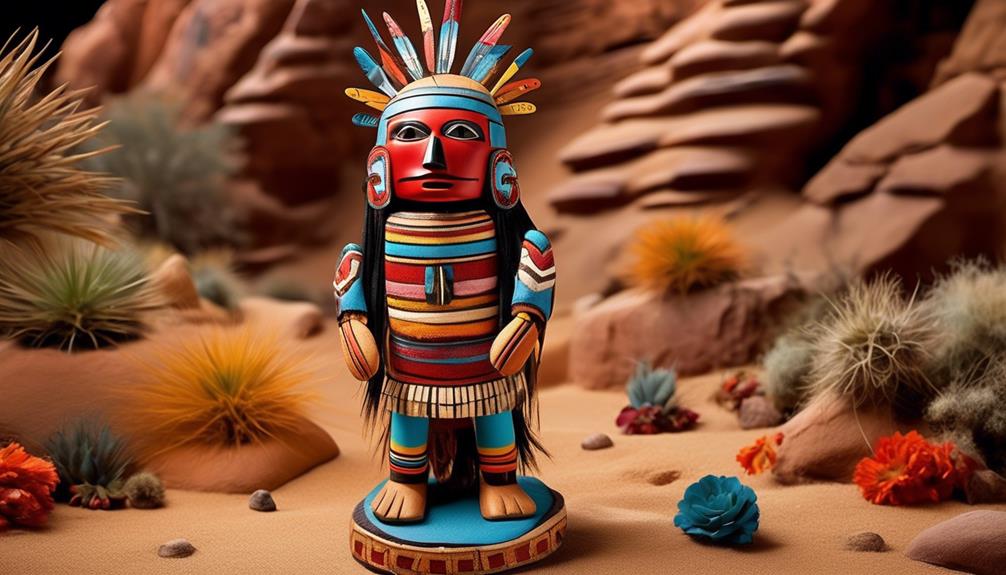
Upon exploring the spiritual deities and sacred stories of the Hopi tribe, one encounters a rich tapestry of mythological beings and narratives that are deeply intertwined with the cultural identity and beliefs of the community.
The Hopi spiritual beliefs are centered around a pantheon of deities, each associated with different aspects of the natural world and human experience. For instance, the Hopi revere Maasaw, the Earth God and guardian of the underworld, who plays a crucial role in their cultural traditions and religious ceremonies.
Additionally, the sacred stories of the Hopi tribe are passed down through oral tradition and depict the creation of the world, the emergence of the Hopi people, and their harmonious relationship with the environment. These narratives emphasize the interconnectedness of all living things and serve as a moral guide for the community, reinforcing values of respect, balance, and responsibility towards the land.
Through these spiritual deities and sacred stories, the Hopi tribe preserves its cultural heritage and imparts essential wisdom to future generations.
Ceremonial Practices and Rituals
Engaging in elaborate ceremonial practices and rituals is an integral aspect of the Hopi tribe's spiritual and cultural traditions. The Hopi people place great significance on maintaining their ceremonial practices, which are deeply rooted in their cultural heritage.
One of the most important ceremonies is the Kachina ceremonies, where masked dancers embody the spirits of deities and ancestors to bring blessings and fertility to the community. These ceremonies are performed throughout the year, each with its own unique significance and purpose.
Shamanic healing is another crucial aspect of the Hopi ceremonial practices. The tribe's shamans, also known as medicine men, play a vital role in the spiritual well-being of the community. Through rituals and traditional healing practices, such as the use of herbs and spiritual guidance, shamans facilitate physical, emotional, and spiritual healing for the members of the tribe.
The ceremonial practices and rituals of the Hopi tribe aren't only religious but also serve as a way to pass down cultural knowledge and traditions from one generation to the next. These practices are a testament to the tribe's deep connection to their spiritual beliefs and the natural world around them.
Connection to Nature and Land
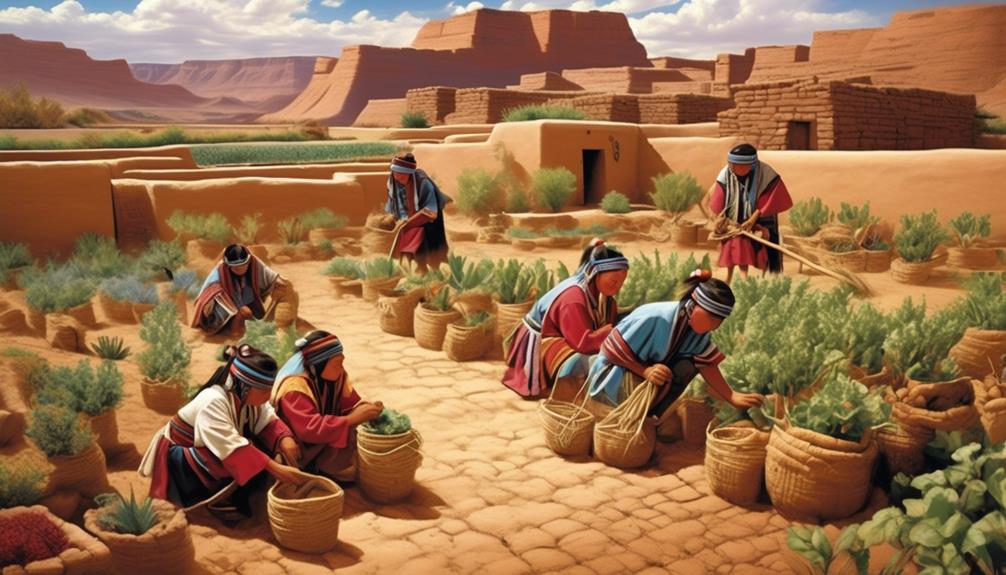
Deeply intertwined with the Hopi tribe's spiritual and cultural traditions is their profound connection to the natural world and the land they inhabit. The Hopi people have a deep reverence for the land, viewing it as sacred and essential to their way of life. This connection is evident in their environmental stewardship and traditional practices, which prioritize sustainability and harmony with nature.
| Environmental Stewardship | Land Reverence | Natural Spirituality |
|---|---|---|
| Conservation of resources | Sacred land sites | Nature as a teacher |
| Sustainable farming methods | Ceremonial significance of landscapes | Spiritual significance of animals and plants |
| Respect for wildlife habitats | Rituals honoring the earth | Connection to natural elements |
The Hopi tribe's land reverence is reflected in their traditional practices, where the land is not seen as a commodity, but as a living entity deserving of respect. Their natural spirituality is evident in the way they view nature as a teacher, finding spiritual significance in animals, plants, and the elements. This profound connection to nature and the land continues to shape the Hopi tribe's cultural identity and guides their way of life.
Influence of Modern Culture on Hopi Religion
The influx of modern culture has brought about noticeable changes in the practice and expression of Hopi religion. As modern influences continue to seep into Hopi society, the traditional ways of practicing and preserving their religion are being challenged.
- Traditional ceremonies and rituals are adapting to incorporate modern elements.
- The younger generation is increasingly exposed to external influences, leading to a shift in their perspectives on spirituality and religion.
- The use of technology and social media has impacted the dissemination of religious teachings and knowledge within the community.
- Economic changes have influenced the availability of resources required for religious practices, leading to adaptations in traditional ceremonies.
- The encroachment of modern infrastructure and urbanization has affected the sacred landscapes and ceremonial spaces integral to Hopi religious practices.
These modern influences have sparked discussions within the Hopi community about how to balance the preservation of their cultural heritage with the inevitable changes brought about by the modern world. As the Hopi people navigate these challenges, they continue to strive for the preservation of their unique religious traditions amidst the evolving cultural landscape.
Frequently Asked Questions
How Has the Hopi Tribe's Religious Beliefs Influenced Their Social Structure and Governance?
Influence from the Hopi tribe's religious beliefs is evident in their governance structure. They have a focus on communal decision-making and spiritual guidance. Women also play significant roles in ceremonial participation, which influences social cohesion and cultural preservation. The tribe's religious beliefs shape their social organization, emphasizing harmony with nature and community interconnectedness. This influence is integral to the tribe's governance practices and social structure, reflecting a deep spiritual connection to their ancestral traditions.
What Role Do Women Play in Hopi Religious Ceremonies and Practices?
In exploring Hopi culture, it's fascinating to note the significant roles women play in ceremonial participation. Their involvement in religious ceremonies and practices is integral to the preservation of tradition and the passing down of cultural knowledge.
Women's roles are diverse and central, ranging from leading ritual dances to maintaining the spiritual and ethical fabric of the community.
This highlights the unique and essential contributions women make within the Hopi religious framework.
How Do the Hopi Tribe's Religious Beliefs Impact Their Views on the Afterlife and Death?
The Hopi tribe's religious beliefs deeply influence their perspectives on the afterlife and death. This impact on the community is evident in their cultural traditions and daily practices. These beliefs shape the Hopi people's understanding of the spiritual realm and guide their rituals and ceremonies related to death.
The interconnectedness of their religious beliefs and the community's way of life is a fundamental aspect of Hopi culture.
Are There Any Specific Taboos or Restrictions in Hopi Religious Practices That Are Not Commonly Known?
We tread carefully through the intricate web of Hopi cultural taboos and ritual restrictions. It's a delicate dance, navigating the unspoken rules and the deep reverence for tradition.
From avoiding certain gestures during ceremonies to respecting sacred sites, the Hopi people hold steadfast to these customs.
These cultural taboos and ritual restrictions aren't widely known, yet they form the backbone of the Hopi way of life, preserving their ancestral wisdom and spiritual connection.
How Has the Hopi Tribe's Religious Beliefs Evolved and Adapted Over Time, Especially in Response to Outside Influences?
Over time, the Hopi tribe's religious beliefs have evolved and adapted in response to outside influences. This evolution has been crucial in the cultural preservation, spiritual practices, and community integration.
Outside influences have prompted the Hopi tribe to adapt their religious beliefs while maintaining their core traditions. This adaptation has allowed the tribe to remain connected to their heritage while also embracing aspects of the changing world around them.
Conclusion
In conclusion, the Hopi tribe followed a unique religion rooted in their spiritual connection to the land and their ceremonial practices.
Their beliefs were shaped by their origins and the influence of modern culture.
Like a tapestry woven with threads of tradition and adaptation, their religious practices continue to be a vital part of their cultural identity, preserving the rich spiritual heritage of the Hopi people.
